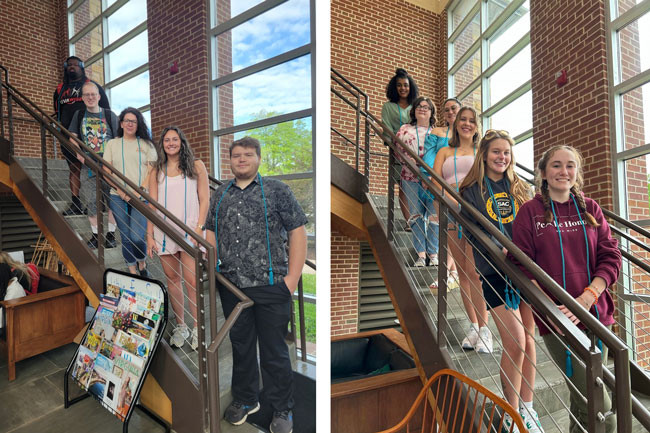UVA Wise CONNECTS
Fostering a stronger relationship between the College and the surrounding community
As a center for community engagement, our primary purpose is to encourage faculty to engage their classes with the community of Wise and the region through revising their current courses to have an Academic Community Engagement (ACE) component.
“UVA Wise CONNECTS affords students and faculty the opportunity to engage in meaningful service learning projects. These opportunities develop civic engagement skills while students gain experience working with members of our SWVA communities.” — Chancellor Donna Henry
What is Academic Community Engagement (ACE)?
Academic Community Engagement (ACE) is a teaching method that combines community engagement with academic instruction. According to the National Service Learning Clearinghouse, this type of teaching method “integrates meaningful community service with instruction and reflection to enrich the learning experience, teach civic responsibility, and strengthen communities.” The ACE initiative encourages students to use the skills, knowledge, and dispositions learned in the classroom to collaborate with community partners in making a difference in society.
Examples of ACE Experiences
- Biology students plant trees and grasses with a conservation group.
- Education students tutor in public schools under the mentorship of master teachers.
- Art students create a hands-on art program for one of the local schools, hospitals, or shelters.
- Political science students work on voter registration and try to increase the voter engagement of the community.
- Sociology students visiting local communities and organizations to learn about how they make a change in their communities.
- Psychology students working with PAWS of SWVA and the animal shelter to train dogs and help get them adopted.
ACE Courses
Previous ACE Courses include BIO 4500 – Medicinal Plants, HUM 1850 – Intro to Appalachian Studies and SOC 3850 – Human Services . View a complete list of previous ACE Courses.
ACE Courses Require:
- The faculty member identifies one or more course objectives that students will address through their ACE experience.
- A statement regarding the importance of community engagement is included in the syllabus.
- The faculty member requires a reflection assignment about the ACE experience that is evaluative and graded as indicated in the course syllabus and included in the final course grade.
- For every one-hour of course credit, each student should dedicate a minimum of three hours to the ACE experience. For example, a 3-credit course would require a minimum of 9 hours on the ACE experience per student per semester.
Application Deadlines
While UVA Wise CONNECTS will accept applications and renewals any time during the academic year, there are definite deadlines if the professor wants the ACE designation to appear on the Registrar’s official schedule of classes:
- Spring Courses – August 15
- Summer Courses – November 15
- Fall Courses – January 15
Let us know if you would like to have your course receive an ACE designation.
Benefits for Students
Gaining an Academic Community Engagement (ACE) designation for your course(s) is both easy and beneficial. Research shows that courses that include community engagement “provides students with opportunities to synthesize, integrate and apply their knowledge. Such experience makes learning more meaningful and ultimately more useful because what students know becomes part of who they are.”
Research on the benefits of Academic Community Engagement (ACE) show that integrating this teaching style enhances students’ academic performance, positively affects their GPA, writing skills, critical thinking, self-efficacy, leadership, and future commitment to engaging in community service needs.
Students who complete three ACE courses receive a community engagement cord to wear at Commencement.

Benefits for Faculty
- ACE First Time Stipend: If you are transitioning a course for the first time to have an ACE component, you qualify for an ACE First Time Stipend, which supports and encourages faculty changes to their existing course curriculum.
- Research/Publishing Opportunities: There are many avenues through which to publish research relating to the integration of community engagement and curriculum.
Benefits for Community Partners
Research on the benefits of Academic Community Engagement (ACE) show that campus-to-community partnerships and relationship-based collaboration enhances social cohesion in addition to a number of related impacts:
- College students have a direct impact on shaping the attitudes and services of professionals in the community as well as their clients, such as youth and the elderly;
- Service learning helps to organizations to sustain and enhance their organizational capacity, and, as they become more knowledgeable about their community, the learning curve for new graduates who have done service learning as students is shortened;
- Community partners report that teaching students about the work they do is enriching and affirms the mission and goals of their work. Many community partners also find their involvement with colleges and universities to add prestige to the reputation of their services;
- Additional impacts include increased community capacity, investments in social justice, a mutual sense of transformational learning, and increased commitment to citizenship and community responsibility.
Complete the community partner survey.
Contacts
- Marion Young, Director of UVA Wise Connects
- Heather Evans, Director of the Experiential Learning HUB